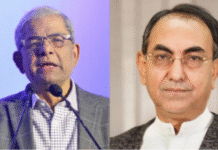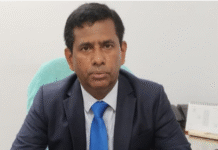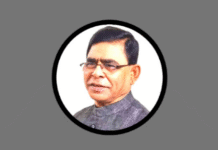
In an apparent move to remove the confusion about its role over war crimes trial in Bangladesh, the European Union (EU) on Wednesday said they are not siding with war criminals by issuing statements but reminded all about its worldwide position against death penalty.
“Please don’t spread this perception that the EU is taking side of war criminals. That’s not obviously the case. It’s not true we take sides,” newly appointed ambassador and head of the EU delegation to Bangladesh Pierre Mayaudon told a press conference in Dhaka.
The envoy, at his first appearance before the crowded press people, also said the EU has always been a supporter of freedom, liberation and human rights worldwide.
Mayaudon made the remark when a questioner mentioned that the EU voluntarily issues statements every time after the verdict against war criminals in Bangladesh that indicates the EU is siding with the war criminals.
Clarifying it further, the EU envoy said whenever they are informed of any case of death penalty they issue statement worldwide. “Some cases are made public, we react, some cases aren’t made public and we’re not in a position to react as we’re not just informed about the cases.”
He also said they have nothing to say provided the due process of law is guided in the proceedings.
The EU issued a statement soon after the verdict on Motiur Rahman Nizami’s trial and called on the Bangladesh authorities to introduce a moratorium on executions as a first step towards definitive abolition of capital punishment.
The EU recalled that they are opposed to the use of capital punishment in all cases and under all circumstances, and has consistently called for its universal abolition.
Asked about EU’s current position over the January-5 elections, Mayaudon said: “It’s a complicated and difficult question, but I’ve an easy answer.”
He referred to a statement issued by Catherine Ashton on January 9 read out the last sentence of the statement.
“The EU urges all parties to refrain from violence and to engage in genuine dialogue to agree on a mutually acceptable way forward to strengthen democratic accountability and to hold transparent, inclusive and credible elections, putting the interests of the people of Bangladesh first,” he read.
The EU diplomat also said he does not have anything to add to this statement and mentioned that the EU will continue to work with the Bangladesh Election Commission for this purpose.
Responding to a question on government’s refusal to have dialogue with BNP, the EU envoy said he does not want to make any comment on Bangladesh’s internal issue.
Earlier, in his written statement, Mayaudon said he, along with the EU delegation, is determined to make his mandate a ‘useful’ and busy one. “A mandate that will be guided by three main drivers: urgency, action and delivery.”
He said the challenges that Bangladesh and the EU are facing together are not of a kind that can be solved only through discussion. “Action must follow.”
The envoy said one of the best translations of this common understanding is that they are just at the beginning of their new seven-year development cooperation programme what they call the multi-annual indicative programme (MIP) 2014-2020 which is in full alignment with Bangladesh’s national strategies and programmes.
It covers three major areas — education and skills development, nutrition and food security and strengthening democratic governance.
Responding to a question on priorities, human rights and governance issues are equally important and fighting corruption is obviously high priority. “Next seven years will be working in strengthening governance with all stakeholders.”
Source: Prothom Alo









